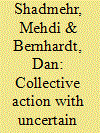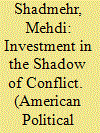|
|
|
Sort Order |
|
|
|
Items / Page
|
|
|
|
|
|
|
| Srl | Item |
| 1 |
ID:
110560


|
|
|
|
|
| Publication |
2011.
|
| Summary/Abstract |
How can one analyze collective action in protests or revolutions when individuals are uncertain about the relative payoffs of the status quo and revolution? We model a "calculus of protest" of individuals who must either submit to the status quo or support revolt based only on personal information about their payoffs. In deciding whether to revolt, the citizen must infer both the benefit of successful revolution and the likely actions of other citizens. We characterize conditions under which payoff uncertainty overturns conventional wisdom: (a) when a citizen is too willing to revolt, he reduces the incentives of others to revolt; (b) less accurate information about the value of revolution can make revolt more likely; (c) public signals from other citizens can reduce the likelihood of revolt; (d) harsher punishment can increase the incidence of punishment; and (e) the incidence of protest can be positively correlated with that of repression.
|
|
|
|
|
|
|
|
|
|
|
|
|
|
|
|
| 2 |
ID:
168535


|
|
|
|
|
| Summary/Abstract |
In conflict-prone societies, the fear of expropriation that accompanies a regime change reduces capital investment. These reductions in investments, in turn, harm the economy, amplifying the likelihood of regime change. This article studies the implications of these feedback channels on the interactions between globalization, capital control, state repression, and regime change. I show that processes that facilitate capital movements (e.g., globalization, economic modernization, and technologies that reduce transportation costs) amplify the likelihood of regime change in conflict-prone societies and strengthen the elite’s demand for a strong coercive state. In particular, to limit their collective action problem and manage the political risk of regime change, capitalists support a state that imposes capital control. We identify two conflicting forces, the Boix Effect and the Marx Effect, which determine when capital control and state repression become complements (Nazi Germany) or substitutes (Latin American military regimes) in right-wing regimes.
|
|
|
|
|
|
|
|
|
|
|
|
|
|
|
|
| 3 |
ID:
193663


|
|
|
|
|
| Summary/Abstract |
How do different types of motivation influence the politics of collective action? We study a model of endogenous rebellion and repression to understand how different types of individual motivation affect participation, state repression, and the mechanisms by which state violence affects political contention. Unlike psychological rewards, material rewards are divided among successful rebels. Thus, in material rewards settings, repression that decreases mobilization and chances of success also increases participants’ share of the rewards, reducing repression’s effect. Consequently, materially rather than psychologically motivated groups are less affected by repression and face less repression, but they are also less able to turn early failures into future successes. Moreover, because repression is more effective and used more when rebels are psychologically motivated, rebel motivations are a confounder in estimates of the relationship between repression and mobilization. This can lead to overestimation of repression’s effect and to more statistically significant results exactly when repression is more effective.
|
|
|
|
|
|
|
|
|
|
|
|
|
|
|
|
|
|
|
|
|